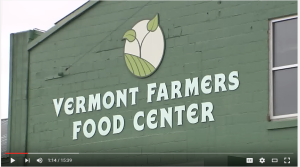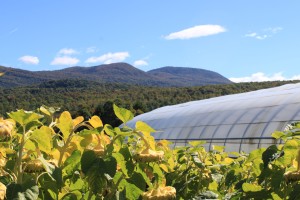 UVM Extension and the Vermont Bioenergy Initiative supported the installation of a multi-source biomass fuel boiler at the Vermont Farmers Food Center in Rutland, Vermont. The boiler uses several alternative fuels, such as wood pellets and grass biomass pucks, to displace propane and heat the 4,200 square foot space, home to the Rutland Winter Farmers’ Market and a variety of food system educational program and events. The biomass project demonstrates the economic advantages when compared to typical propane heaters, including a much smaller payback period (roughly 2-8 years) when using biomass fuel sources. Chris Callahan, a UVM Extension Agricultural Engineer, directed the project and worked closely with the Vermont Farmers Food Center to fit a biomass fuel boiler for the space specifications.
UVM Extension and the Vermont Bioenergy Initiative supported the installation of a multi-source biomass fuel boiler at the Vermont Farmers Food Center in Rutland, Vermont. The boiler uses several alternative fuels, such as wood pellets and grass biomass pucks, to displace propane and heat the 4,200 square foot space, home to the Rutland Winter Farmers’ Market and a variety of food system educational program and events. The biomass project demonstrates the economic advantages when compared to typical propane heaters, including a much smaller payback period (roughly 2-8 years) when using biomass fuel sources. Chris Callahan, a UVM Extension Agricultural Engineer, directed the project and worked closely with the Vermont Farmers Food Center to fit a biomass fuel boiler for the space specifications.
Check out this video featuring the project on Across the Fence, the longest-running locally-produced program in the US:
Farmers in Vermont are making their own biodiesel from sunflowers, and maybe you have wondered: Can I do that?
First, you might be interested to watch this video on growing sunflowers for biodiesel:
You may be interested in increasing self-sufficiency, replacing fossil fuel with a renewable or saving $2.00 per gallon on diesel fuel. But can the average landowner grow their biodiesel?
Land is the first thing needed to grow sunflowers. But most homesteaders or homeowners are not likely to have the equipment required for producing their own biodiesel, like a combine for harvesting the sunflowers, an oilseed press for extracting oil and a processor for converting the oil to biodiesel. These are expensive pieces of equipment that require a good deal of know-how, and the payback just isn’t there for the small-time producer.
Processing can be done, however, at some on-farm facilities, including Borderview Research Farm in Alburgh, State Line Biofuel Farm in North Bennington and other private farms, or in conjunction with other farms growing oilseeds like Woods Market Garden in Brandon and Ekolott Farm in Newbury. Growers located near to these farms could consider growing oilseeds on their land and bringing them to a nearby facility for processing into biodiesel.
Those wishing to purchase locally-grown biodiesel can also look to Full Sun Company in Middlebury, who will be providing to consumers biodiesel fuel made from recycled cooking oil produced at their Vermont mill and made from locally-grown oilseeds like soybeans, canola and sunflowers.
For growers that do have the land available for oilseed production and a place to process their seed, the growing manual “Oilseed Production in the Northeast” by Dr. Heather Darby at University of Vermont Extension is a useful resource. Those considering the economics of this endeavor should download the “Oilseed Cost and Profit Calculator” produced by Chris Callahan PE at UVM Extension. For more resources including videos, image galleries, reports and helpful links, click to learn more about growing oilseeds for biofuel.






